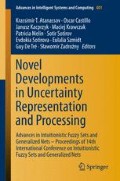Abstract
In this paper we are presenting the recently proposed approach Intercriteria Analysis (ICrA) for assessment of the pollution index of the Struma River in Bulgaria. The approach is based on the apparatus of the index matrices and the intuitionistic fuzzy sets. At the first we have investigated all indexes at the all measurement point with ICrA and we have searched the dependences between points. Results show the measurement points are dependent criteria and we have ignored some over others. At the second we have applied the ICrA to establish the pollution relations and the model structure based on different criteria involved in the Struma River. The investigations show that there are three positive consonances and dissonances between criteria. Using of a Modification of the Time Series Analysis (MTSA) method we have developed an adequate mathematical model of the pollution dynamic as function of time.
Access this chapter
Tax calculation will be finalised at checkout
Purchases are for personal use only
References
Ilkova, T.C., Petrov, M.M: Investigation of the pollution of the Struma River by application of a modified times series analysis method. Modelling and Prognosis. Ecology and Safety. International Scientific Publication 2, 495–506 (2008)
Ilkova, T.C., Petrov, M.M., Atanasova, M.P., Diadovski, I.K.: Modeling of the water pollution of the Struma River at the end of the Bulgarian part. J. Balkan Ecol. 9, 435–441 (2007)
Ilkova, T.S., Petrov M.M.: Choice of Adequate Model for Modelling, Analysis and As-sessment of Water River Ecosystems. Int. J. Bioautomation 9, 100–107 (2008)
Atanassov, K.T., Mavrov, D., Atanassova, V.K: Intercriteria decision making: a new approach for multicriteria decision making, based on index matrices and intuitionistic fuzzy sets. Issues Intuitionistic Fuzzy Sets Generalized Nets 11, 1–8 (2014)
Atanassov, K.T.: Generalized Index Matrices: Comptesrendus de l’AcademieBulgare des Sciences 11, 15–18 (1987)
Atanassov, K.T.: On index matrices, part 1: standard cases. Adv. Studies Contemp. Math. 20(2), 291–302 (2010)
Atanassov, K.T.: On index matrices, part 2: intuitionistic fuzzy case. Proc. Jangjeon Math. Soc. 13, 121–126 (2010)
Atanassov, K.T.: On Intuitionistic Fuzzy Sets Theory. Springer, Berlin (2012)
Atanassov, K.T., Szmidt, E., Kacprzyk, J.: On intuitionistic fuzzy pairs. Notes Intuitionistic Fuzzy Sets 19, 1–13 (2013)
Atanassova, V.K., Doukovska, L., Mavrov, D., Atanassov, K.T.: InterCriteria decision making approach to eu member states competitiveness analysis: temporal and threshold analysis. Proc. IEEE Int. Syst. 1, 97–106 (2014)
Atanassova, V.K., Doukovska, L., Atanassov, K.T., Mavrov, D.: Intercriteria decision making approach to EU member states competitiveness analysis. Proc. Int. Symp. Bus. Model. Soft. Des. 1, 289–294 (2014)
Atanassova, V.K., Vardeva, I: Sum- and average-based approach to criteria shortlisting in the InterCriteria analysis. Notes Intuitionistic Fuzzy Sets 20(4), 41–46 (2014)
Atanassova, V.K., Mavrov, D., Doukovska, L., Atanassov, K.T.: Discussion on the threshold values in the InterCriteria decision making approach. Notes Intuitionistic Fuzzy Sets 20(2), 94–99 (2014)
Ilkova, T.S., Petrov, M.M.: Application of InterCriteria analysis to the Mesta River pollution modelling. Notes Intuitionistic Fuzzy Sets 21(2), 118–125 (2015)
Lange, H.: Time-series Analysis in Ecology. Wiley (2001)
Nicklow, J.: Discrete-time optimal control for water resources engineering and management. Water Int. 25(1), 89–95 (2000)
Stoyanov, S.: Optimization Methods and Algorithms. Technique, Sofia (1990) (in Bulgarian)
Acknowledgements
The authors are thankful for the support provided by the project DFNI-I-02-5/2014 “InterCriteria Analysis—New Approach for Decision Making”, funded by the National Science Fund, Bulgarian Ministry of Education and Science.
Author information
Authors and Affiliations
Corresponding author
Editor information
Editors and Affiliations
Rights and permissions
Copyright information
© 2016 Springer International Publishing Switzerland
About this paper
Cite this paper
Ilkova, T., Petrov, M. (2016). Using Intercriteria Analysis for Assessment of the Pollution Indexes of the Struma River. In: Atanassov, K., et al. Novel Developments in Uncertainty Representation and Processing. Advances in Intelligent Systems and Computing, vol 401. Springer, Cham. https://doi.org/10.1007/978-3-319-26211-6_30
Download citation
DOI: https://doi.org/10.1007/978-3-319-26211-6_30
Published:
Publisher Name: Springer, Cham
Print ISBN: 978-3-319-26210-9
Online ISBN: 978-3-319-26211-6
eBook Packages: Computer ScienceComputer Science (R0)

